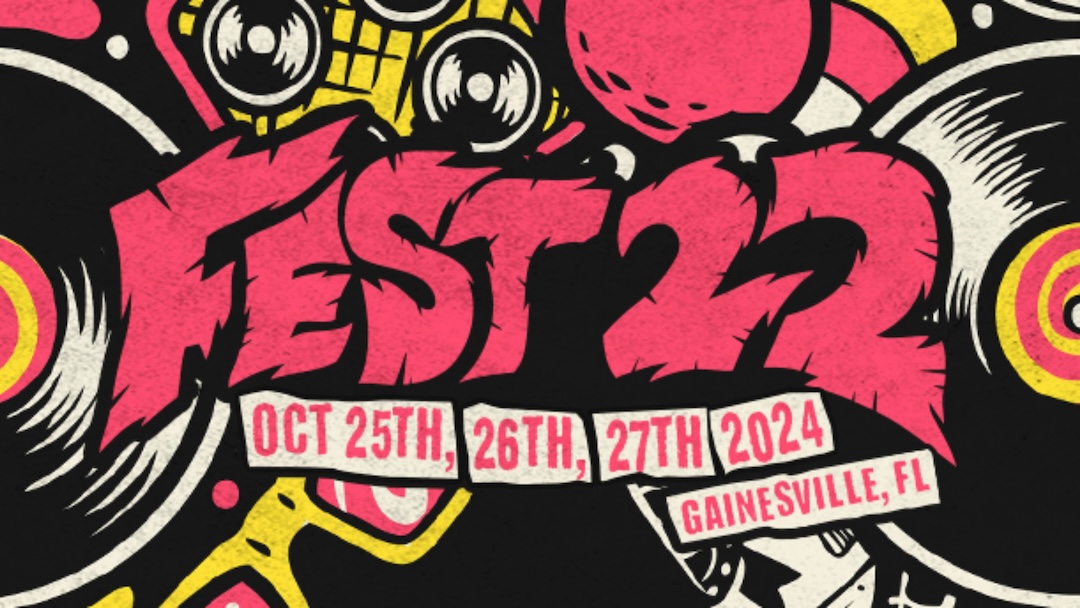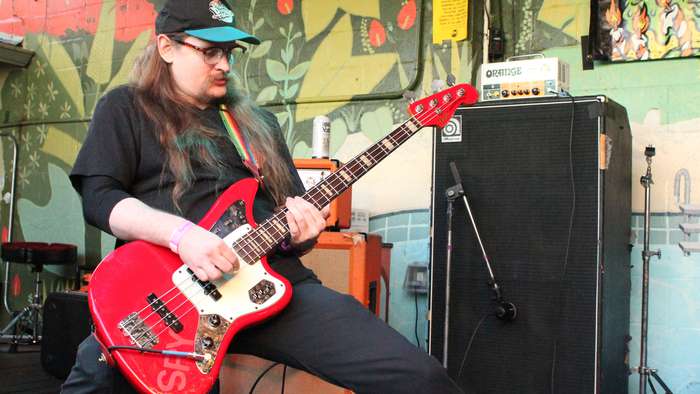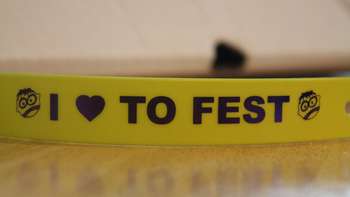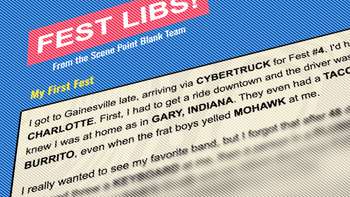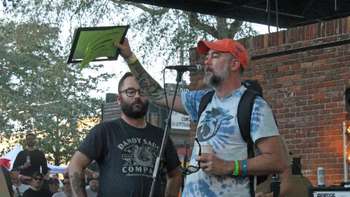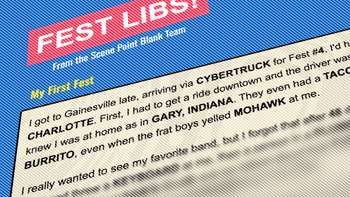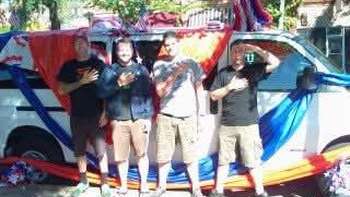American Television
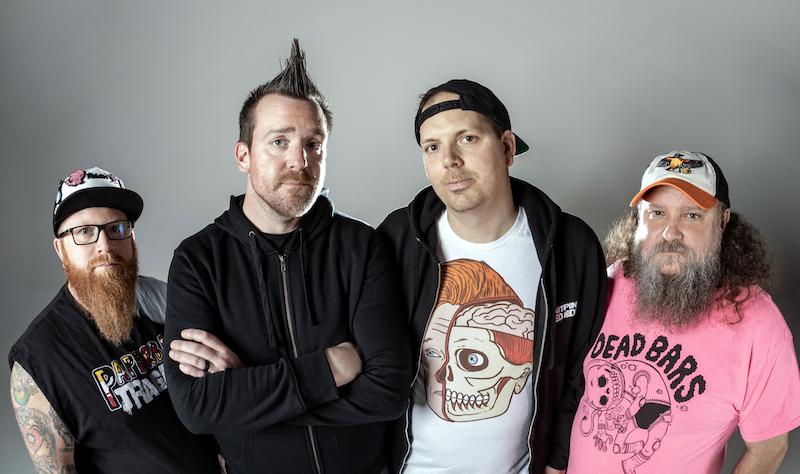
American Television caught my attention with the release of Scars last year. The DC band play short, fast and punchy punk that gets struck in your head.
We asked them about the band’s evolution, the legacy of DC punk and, of course, what they’re planning at FEST 22.
Scene Point Blank: Who am I speaking with? Can you give us some background of "your musical journey" up until this point? (e.g. When did you start playing music and what band(s) led you to this point?)
Bryan: This is Bryan and I play drums in American Television. I started playing music in high school and it probably started with Nirvana. I got into more punk and underground music from there. The Fat and Epitaph bands, plus the Dischord bands like Fugazi and Jawbox, growing up in Northern Virginia. I like all kinds of music, but mostly guitar driven, heavy bands with melody.
Steve: I sing and play guitar with American Television. I started getting into punk/hardcore around '96 (age 14/15), just connecting with everything from Minor Threat to The Toasters. I eventually entrenched myself in the local scene in Long Island and NYC. I picked up a guitar soon after that and have had a few bands in NY over the years, but American Television has been my longest running band since moving to Virgina when I was 30.
Chris: I play guitar and annoy everyone else in American Television. I grew up as a musical kid, Nirvana was huge for me, like most kids, but my uncle got me into Minor Threat around '94/’95 when I was 13/14 and I have been hooked on punk rock ever since. I am a big fan of fast melodic music: Thousand Islands Records, Fat, Epitaph, SBAM, Smartpunk etc... I stepped away from music for well about 15 years while my wife and I focused on raising our family but I got lucky when the AMTV dudes decided to adopt me and bring me back to all this.
Scene Point Blank: I feel like most of the punk bands I personally listen to these days have multiple singers. How did American Television choose the one singer approach?
Bryan: That's how it was set up when I joined the band, lol! Our old guitarist Jerred sang the verses on a few songs on the first LP Watch It Burn, but we mostly stuck to harmonies on Scars.
Steve: Hmm, I write vocal melodies while writing/strumming, so I tend to bring stuff that's a little more formed to practice. I'm not always singing by myself though, we do lots of harmonies or group vocals.
Scene Point Blank: How many times have you played The Fest? How many times have you personally attended (if that # is different)?
Bryan: This will be our third time playing and my third time attending.
Scene Point Blank: What are you most excited about at this year's Fest?
Bryan: Just to be back there, honestly. We took last year off and missed being there with so many like-minded folks and friends.
Scene Point Blank: Speaking of festivals more broadly, you helped to put on Breakin' Even Fest in DC. Did you break even, haha? But seriously, how was the experience and how does organizing your own event change how you view other festivals?
Bryan: We did! And we broke even every year we put on the event, which was five times. Our event was on a smaller scale. It was multiple nights at a single venue, so it certainly gives me a bigger sense of amazement at what Tony and crew are able to pull off at Fest.
Steve: Until you run a festival, you probably don't understand how many bands can't make the date work: 15 bands x 3 nights x ~4 members per band = ~180 people's schedules need to align to pull that off. We've never had the lineup look exactly how we pictured it on day one of planning, but that's part of the fun.
Scene Point Blank: You also did the Dischord tribute on For Love Of Records. How was that experience? (I have another Dischord question later.)
Bryan: This was our second time covering Fugazi, one of the world's greatest bands. Hopefully we did them justice. This was our first time recording with our new guitarist Chris, so we're happy to have something out in the wild that he appears on.

Scene Point Blank: It's been a year+ since Scars came out. How long were you working on that record? Are you working on its follow-up?
Steve: A couple songs on that record are off a single release we did in 2018, so if you include those it’s 5 years. But more like a year and a half in the works. We like to play shows throughout the year, so hunkering down to write isn't really our style. We just do it when the feeling hits. We are working on songs for something in 2025...
Scene Point Blank: Do you view American Television as an "album band" or what medium/release format best fits how the band operates?
Bryan: It all really depends on how quickly we write songs. Right now, I'm excited about the new songs we're writing and really want to release some originals performed by our new lineup. Not sure if that means doing a split, an EP, or saving up for another full-length. We're pretty flexible/indecisive.
Scene Point Blank: It seems like your songs neatly fall in that 2-3 minute range. Is that something you strive for, or does it just happen that way?
Bryan: I definitely try to make the guys edit what we've written to fall in that range. Not really sure why, it just feels right!
Scene Point Blank: Everybody immediately thinks of Dischord when they think of DC, which is obviously great. But how do you describe the scene and "DC Sound" in 2024?
Bryan: While there are a few melodic punk bands in town (us, Celebration Summer, Curse Words, Truth or Dare, Bad Moves), thrashy punk/HC and quirky indie rock have always been what drives this town. We try to play with those bands when we can.
" I think we all need to do our part to hand over a scene that can do the same for the new generation."
Scene Point Blank: The first song on Scars is called "New Generation," which I feel ties into that last question but I want to build on it. Why do you think it's important for scenes to keep growing and evolving? It feels like, when I was younger, bands put out 1-3 records and broke up. Now they're together for 20 years or more. I take it from your song that you view feeling old as a good thing when new, younger bands pop up?
Steve: We love playing music: it's catharsis, it's creative, it's a reason to hang with your best friends regularly and stay connected to people for years and years. It's a good time; shit, it's a great time! That said, I feel the scene has always been for young people to mold into what they need at that moment -- it could be political, it could be silly, it could be the sickest music project you've ever seen changing the music landscape in real-time. We'd probably be categorized as an old band now, and I'm ok with that. If we inspired someone to shape their scene through songwriting, booking, taking photos, creating art, or introducing a friend to it all -- I love that. I hope that just keeps perpetuating, and I hope they make it their own -- I'll still be writing songs if they need an old fuck to fill a hole on the bill.
Chris: I had a strange childhood and, looking back at it all now, I can honestly say that music and punk rock saved my life. It gave me a place to feel welcome, not alone, safe (however you want to define that ) -- and it’s where I figured out what kind of person I was and wanted to be. I’ve made lifelong friends, my marriage and kids because of musical connections. I think we all need to do our part to hand over a scene that can do the same for the new generation.
Scene Point Blank: Do you have any surprises in store for your FEST 22 set?
Bryan: We'll have a couple new songs people haven't heard before, but we're just focused on having fun and sounding good. Nothing wacky.
Now, a rapid fire Fest-focused Q&A:
